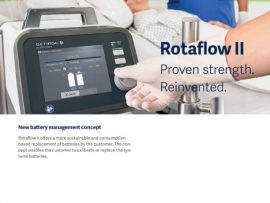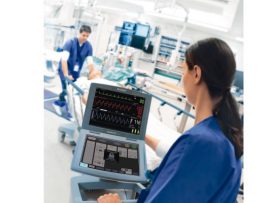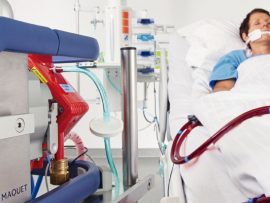Abstract Importance The optimal approach to the use of venoarterial extracorporeal membrane oxygenation (ECMO) during cardiogenic shock is uncertain. Objective To determine whether early use of moderate hypothermia (33-34 °C) compared with..
Read MoreAbstract Prognostic significance of elevated serum lactate in patients on venoarterial extracorporeal membrane oxygenation (ECMO) is widely known. Our objective was to study the utility of lactate measured at different points of..
Read MoreAbstract Veno-arterial extracorporeal membrane oxygenation (VA-ECMO) is used as mechanical circulatory support in cardiogenic shock (CS). It restores peripheral perfusion, at the expense of increased left ventricle (LV) afterload. In..
Read MoreAbstract Background: Peripheral veno-arterial extracorporeal membrane oxygenation (V-A ECMO) is used to support circulatory failure refractory to conventional therapy. However, data on the heart-ECMO interaction at different levels of ECMO..
Read MoreAbstract Background Within the past ten years, continuous-flow Left Ventricular Assist Devices (LVADS) have replaced pulsatile-flow LVADs as the standard of care for both destination therapy and bridging patients to..
Read MoreAbstract Cardiogenic shock is associated with high mortality. Patients often require temporary mechanical circulatory support. We aimed to develop a percutaneously implantable, assist device that unloads the left ventricle (LV)..
Read MoreAbstract Aim Patients with cardiogenic shock or ARDS, for example, in COVID-19/SARS-CoV-2, may require extracorporeal membrane oxygenation (ECMO). An ECLS/ECMO model simulating challenging vascular anatomy is desirable for cannula insertion..
Read MoreAbstract Introduction and objectives Lactate and its evolution are associated with the prognosis of patients in shock, although there is little evidence in those assisted with an extracorporeal venoarterial oxygenation..
Read MoreAbstract Cardiogenic shock is an uncommon but serious complication of acute myocardial infarction. Temporary mechanical circulatory support devices are being used more often in this setting, and physicians are required..
Read MoreAbstract Background: Veno-arterial extracorporeal membrane oxygenation (VA-ECMO) is the rescue treatment proposed to patients with refractory cardiogenic shock. The VA-ECMO implantation promotes inflammation and ischemia-reperfusion injuries through the VA-ECMO flow, causing..
Read MoreAbstract Objective Current guidelines consider obesity to be a relative contraindication to veno-arterial extracorporeal membrane oxygenation (VA-ECMO) for refractory cardiogenic shock. The authors investigated the effect of body mass index..
Read MoreAbstract Introduction The impact of Impella and ECMO (ECPELLA) in (CS) remains to be defined. The aim of this meta-analysis is to evaluate the benefit of ECPELLA compared to VA-ECMO in..
Read MoreAbstract Background Single-center studies suggest that implementation of multidisciplinary (CS) teams is associated with improved CS survival. Objectives The aim was to characterize practice patterns and outcomes in the management of..
Read MoreAbstract Refractory cardiogenic shock (CS) often requires veno-arterial extracorporeal membrane oxygenation (VA-ECMO) to sustain end-organ perfusion. Current animal models result in heterogenous cardiac injury and frequent episodes of refractory ventricular..
Read MoreVanderbilt University Medical Center; Department of CV Surgery: Faculty Forum Update on ECMO for COVID-19: What have we learned? Faculty: J. Hoffman, MD, Matt Warhoover, CCP, A. Lepore, CCP..
Read MoreAbstract Dynamic or hybrid configurations for extracorporeal membrane oxygenation (ECMO) are needed when patient physiology or clinical conditions change. Dynamic configurations included configurations converting from veno-arterial (V-A) ECMO or veno-venous..
Read MoreAbstract Background The usefulness of right heart catherization (RHC) has long been debated, and thus, we aimed to study the real‐world impact of the use of RHC in cardiogenic shock...
Read MoreAbstract Background Bloodstream infections (BSIs) are frequent on veno-arterial extracorporeal membrane oxygenation (V-A ECMO). Performing routine blood cultures (BCs) may identify early paucisymptomatic BSIs. We investigated the contribution of systematic..
Read MoreAbstract Dynamic or hybrid configurations for extracorporeal membrane oxygenation (ECMO) are needed when patient physiology or clinical conditions change. Dynamic configurations included configurations converting from veno-arterial (V-A) ECMO or veno-venous..
Read MoreAbstract Veno-arterial extracorporeal membrane oxygenation (VA-ECMO) provides a temporary support system for patients with cardiogenic shock refractory to conventional medical therapies. It has been reported that levosimendan may facilitate VA-ECMO..
Read MoreAbstract Background RotaFlow and Levitronix CentriMag veno-arterial extracorporeal membrane oxygenation (ECMO) support systems have been investigated as treatment for refractory cardiogenic shock (CS). Methods Between 2004 and 2012, 119 consecutive..
Read MoreAbstract Objectives We investigated whether intra-aortic balloon pump (IABP) combined with venoarterial extracorporeal membrane oxygenation (VA-ECMO) was associated with favourable neurological outcomes for patients after the return of spontaneous circulation..
Read MoreAbstract Objective To explore whether pre-cannulation international normalized ratio (INR) is associated with in-hospital mortality in veno-arterial extracorporeal membrane oxygenation (VA-ECMO) patients. Design Retrospective observational cohort study. Setting Quaternary care..
Read MoreAbstract In SARS-CoV-2 patients with severe acute respiratory distress syndrome (ARDS), Veno-Venous Extracorporeal Membrane Oxygenation (V-V ECMO) was shown to provide valuable treatment with reasonable survival in large multi-centre investigations...
Read MoreAbstract Background: Extracorporeal cardiopulmonary resuscitation (ECPR) for refractory cardiac arrest has improved mortality in post-cardiac surgery patients; however, loss of neurologic function remains one of the main and devastating complications...
Read MoreAbstract Treatment of end-stage heart failure has markedly evolved. With only a limited number of available heart transplants (24 in 2012) in our institution, mechanical circulatory support (MCS) has become..
Read MoreAbstract Venoarterial extracorporeal membrane oxygenation (VA ECMO) is used to provide cardiopulmonary support in cardiogenic shock; however, high extracorporeal flow may increase left ventricular (LV) afterload leading to LV distention..
Read MoreAbstract Cardiogenic shock (CS) remains the leading cause of death in patients hospitalised with acute myocardial infarction with mortality as high as 40%–50% prior to hospital discharge. The failure of..
Read MoreAbstract Objectives: Refractory postcardiotomy cardiogenic shock complicating cardiac surgery yields nearly 100% mortality when untreated. Use of venoarterial extracorporeal membrane oxygenation for postcardiotomy cardiogenic shock has increased worldwide recently. The aim of the current..
Read MoreAbstract Cardiogenic shock is an acute emergency, which is classically managed by medical support with inotropes or vasopressors and frequently requires invasive ventilation. However, both catecholamines and ventilation are associated..
Read More


















